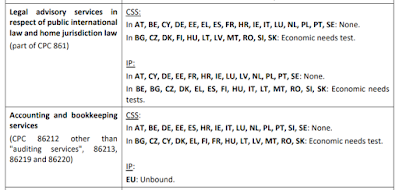A lot of services involves the movement of people, architects, lawyers, engineers and so on and we have essentially been in lock down since the start of January so the impact has to a large extent been hidden I assume. The full effect of Brexit won't be felt in services for months.
However, I noted a blog post on Make UK (they used to be the Engineering Employers Federation), about contractual service suppliers (CSS) and or independent professionals (IP). These are workers from the EU or the UK travelling for the purpose of work into the other territory.
I was interested because many UK companies I know exist by buying packaging machines from EU manufacturers, mainly because nobody in this country makes that kind of kit any more and even in the limited areas (very limited) where you can buy local, it isn't very good. Anyway, they may get an order from a UK customer and place a contract on the EU supplier, essentially becoming a middle man. The order would usually include commissioning services by an EU engineer.
But there may be a problem here. Make UK, in a Q&A style advice piece, say:
Does the TA [trade agreement] cover them?
The TA has a section on what it calls contractual service suppliers – essentially EU workers coming to the UK to provide short-term services to a UK customer, subject to some rules.
So, all is well then?
Not quite – frequently, UK firms may have contracted with an EU business to supply goods, or services. And they then later on want the workers of the EU business to come to the UK. But, the TA says that the EU business has to contract directly with the final UK consumer, meaning that if the contract was between the UK firm and the EU business, but the final consumer has contracted with the UK firm, the TCA can’t help.
What other problems are there for EU service suppliers?
The Home Office has produced guidance on this part of the TA. Their guidance makes it clear that there must be a genuine contract, between the business in the EU employing the workers, and the final UK consumer, so there is no easy fix. The guidance also makes it clear that if the EU business has a UK footprint (a subsidiary, or distributor maybe), then this route cannot be used.
Note the EU business, in order to be legally able to send an engineer must have a contract with the "final UK customer" which is going to cause a lot of issues for some UK businesses who are I assume regarded as a distributor of the EU product, and may not be able to use an EU engineer anyway.
I looked at the TCA contractual service section dealing with UK engineers working in the EU and it looks like an absolute nightmare.
Every Member State has different rules it seems, some with an economic needs test, all set out in ANNEX SERVIN-4: CONTRACTUAL SERVICE SUPPLIERS [CSS] AND INDEPENDENT PROFESSIONALS [IP] on page 747.
There are plenty of different categories, here is the legal services bit. The left hand column is the category and the right hand column the reservations applied by AT=Austria, BE=Belgium and so on:
But for EU CSS or IP workers coming to the UK (starting on page 786):
I just showed a couple of the 36 categories but there is not a single one where the UK government has placed any reservations at all on EU workers coming here as CSS or IP. There are no economic test requirements.
Elsewhere (page 101 item (b)) the CSS is defined as:
"contractual service suppliers" means natural persons employed by a legal person of a Party (other than through an agency for placement and supply services of personnel), which is not established in the territory of the other Party and has concluded a bona fide contract, not exceeding 12 months, to supply services to a final consumer in the other Party requiring the temporary presence of its employees who:
(i) have offered the same type of services as employees of the legal person for a period of not less than one year immediately preceding the date of their application for entry and temporary stay;
(ii) possess, on that date, at least three years professional experience, obtained after having reached the age of majority, in the sector of activity that is the object of the contract, a university degree or a qualification demonstrating knowledge of an equivalent level and the professional qualifications legally required to exercise that activity in the other Party; and
(iii) do not receive remuneration from a source located within the other Party;
In my experience, some UK companies will struggle to comply. It's far from unusual to find an engineer from the UK arriving on site to say "never seen one of these before" when talking about the complex and very expensive machine he has been sent to install/commission or repair. EU companies are far more serious about training, certificates and qualifications.
Some Member States may be surprised to learn the UK requires no professional qualifications for many engineering functions provided in industry.
It's another example of how the government is tilting the playing field in favour of the EU and handicapping UK businesses providing services in continental Europe or Ireland.



